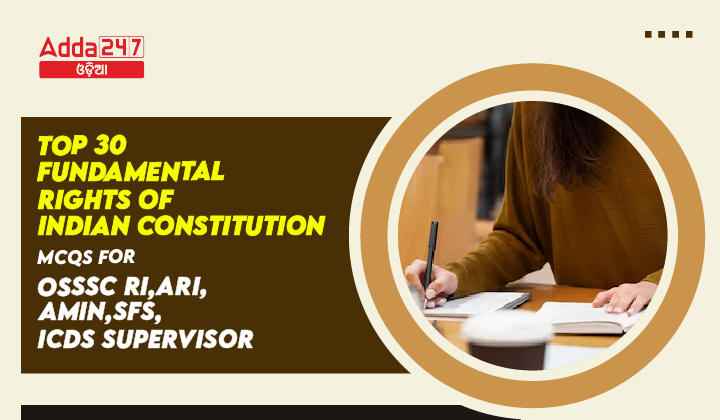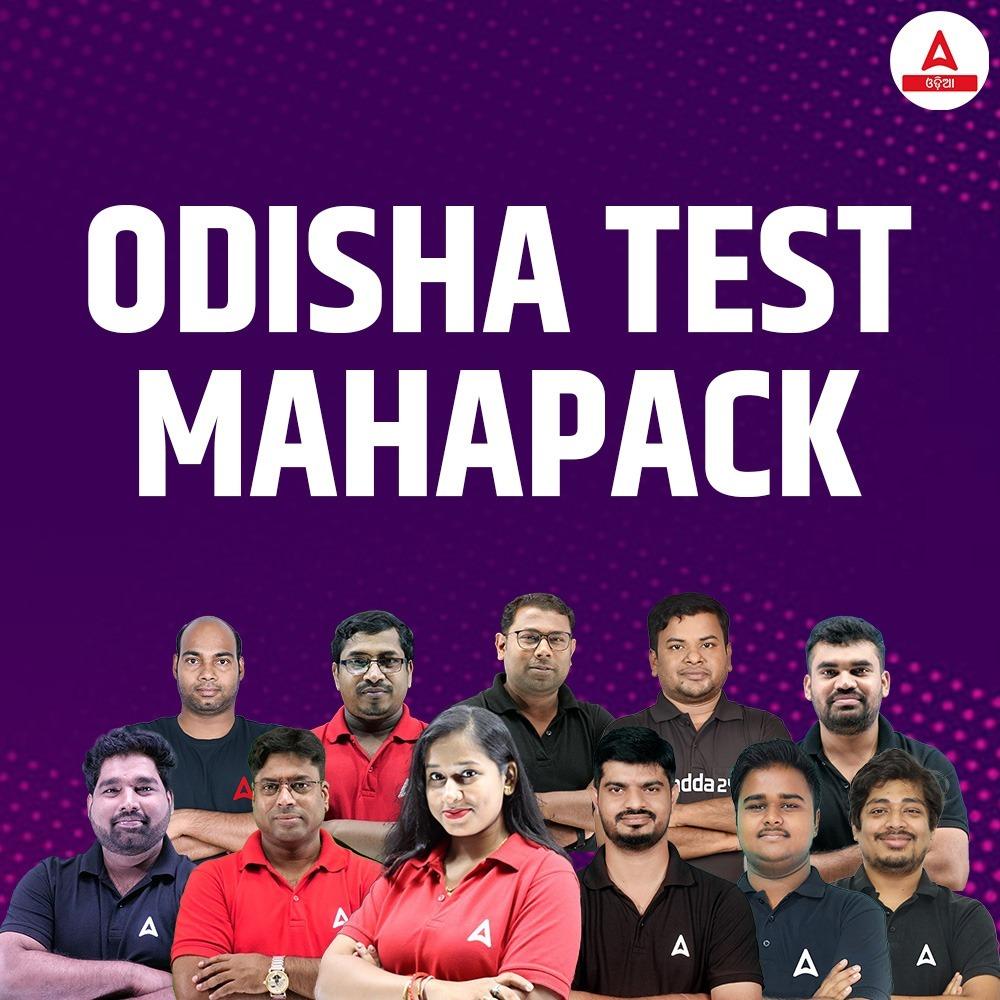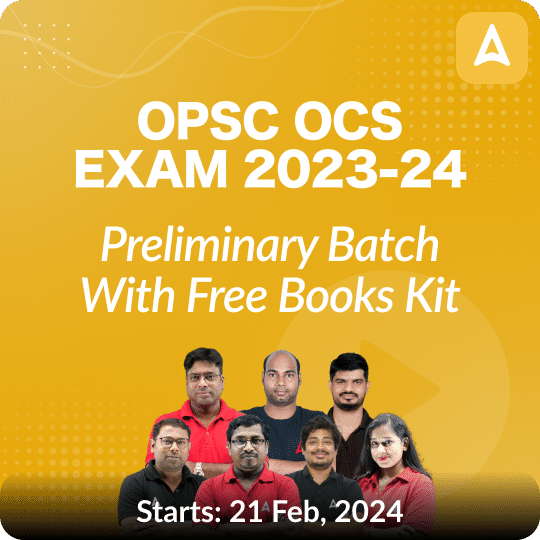Fundamental Rights are the cornerstone of the Indian Constitution, providing citizens with essential freedoms and protections. For aspirants preparing for OSSSC RI, ARI, Amin, SFS, ICDS Supervisor exams, a thorough understanding of these rights is crucial. Here, we present a set of multiple-choice questions (MCQs) covering the top 30 Fundamental Rights, designed to aid your preparation.
Top 30 Fundamental Rights Of Indian Constitution MCQS For OSSSC RI,ARI, Amin, SFS, ICDS Supervisor
A sound understanding of the Fundamental Rights guaranteed by the Indian Constitution is indispensable for aspirants preparing for competitive exams like OSSSC RI, ARI, Amin, SFS, and ICDS Supervisor. These MCQs serve as a valuable tool for self-assessment and revision, aiding candidates in their journey toward success.
- Question: Which article of the Indian Constitution guarantees the Right to Equality?A) Article 14
B) Article 16
C) Article 17
D) Article 15
Answer: A) Article 14 - Question: The Right to Equality includes provisions against:A) Discrimination based on religion
B) Discrimination based on race
C) Discrimination based on gender
D) All of the above
Answer: D) All of the above - Question: Which article of the Indian Constitution guarantees the Right to Freedom of Speech and Expression?A) Article 19
B) Article 20
C) Article 21
D) Article 22
Answer: A) Article 19 - Question: The Right to Freedom includes:A) Freedom of speech and expression
B) Right to assemble peacefully
C) Right to form associations or unions
D) All of the above
Answer: D) All of the above - Question: Which article of the Indian Constitution prohibits trafficking and forced labor?A) Article 23
B) Article 24
C) Article 25
D) Article 26
Answer: A) Article 23 - Question: The Right against Exploitation ensures:A) Right to fair wages
B) Prohibition of child labor
C) Right to education for all children
D) All of the above
Answer: B) Prohibition of child labor - Question: Which article of the Indian Constitution guarantees the Right to Freedom of Religion?A) Article 25
B) Article 26
C) Article 27
D) Article 28
Answer: A) Article 25 - Question: The Right to Freedom of Religion includes:A) Right to propagate religion
B) Right to convert others by force
C) Right to practice religion freely
D) All of the above
Answer: C) Right to practice religion freely - Question: Which article of the Indian Constitution guarantees Cultural and Educational Rights?A) Article 29
B) Article 30
C) Article 31
D) Article 32
Answer: A) Article 29 - Question: The Cultural and Educational Rights include:A) Right to conserve language, script, or culture
B) Right to compulsory primary education
C) Right to free education for all
D) All of the above
Answer: A) Right to conserve language, script, or culture - Question: Which article of the Indian Constitution guarantees the Right to Constitutional Remedies?A) Article 32
B) Article 33
C) Article 34
D) Article 35
Answer: A) Article 32 - Question: The Right to Constitutional Remedies empowers citizens to:A) Challenge the violation of fundamental rights in court
B) File a complaint against the government
C) Overthrow the government
D) All of the above
Answer: A) Challenge the violation of fundamental rights in court - Question: Which articles of the Indian Constitution deal with Fundamental Rights?A) Articles 1-11
B) Articles 12-35
C) Articles 36-51
D) Articles 52-75
Answer: B) Articles 12-35 - Question: Fundamental Rights in the Indian Constitution are conferred upon:A) Only citizens of India
B) Both citizens and non-citizens residing in India
C) Only government officials
D) Only members of the Parliament
Answer: A) Only citizens of India - Question: Which part of the Indian Constitution deals with Fundamental Rights?A) Part I
B) Part II
C) Part III
D) Part IV
Answer: C) Part III - Question: Which article of the Indian Constitution prohibits discrimination on the grounds of religion, race, caste, sex, place of birth, and gender?A) Article 14
B) Article 15
C) Article 16
D) Article 17
Answer: B) Article 15 - Question: Article 15 allows the State to make special provisions for:A) All citizens equally
B) Only women and children
C) Socially and educationally backward classes
D) Religious minorities
Answer: C) Socially and educationally backward classes - Question: Which article of the Indian Constitution guarantees equality of opportunity in matters of public employment?A) Article 14
B) Article 15
C) Article 16
D) Article 17
Answer: C) Article 16 - Question: Article 16 creates exceptions for the implementation of measures of affirmative action for:A) Religious institutions
B) Women and children
C) Backward classes
D) Foreign citizens
Answer: C) Backward classes - Question: Which article of the Indian Constitution abolishes the practice of untouchability?A) Article 15
B) Article 16
C) Article 17
D) Article 18
Answer: C) Article 17 - Question: The practice of untouchability, as per Article 17, is an offense punishable by law under:A) The Constitution
B) The Protection of Civil Rights Act, 1955
C) The Indian Penal Code
D) The Criminal Procedure Code
Answer: B) The Protection of Civil Rights Act, 1955 - Question: Which fundamental rights cannot be suspended even during an emergency?(a) Right to Speech
(b) Right to Religion
(c) Right to Equality
(d) Right to Life and Personal Liberty
Ans: (d) Right to Life and Personal Liberty - Question: Where are the Fundamental Duties mentioned in the Indian Constitution?(a) Part-IV A
(b) Part-IV
(c) Part-III
(d) In schedule IV-A
Ans: (a) Part-IV A - Question: Which Article of the Indian Constitution contains Fundamental Duties?(a) 45 A
(b) 51 A
(c) 42
(d) 30B
Ans: (b) 51 A - Question: Which of the following are Fundamental Duties?(a) Safeguarding public property
(b) Protecting the sovereignty, integrity and unity of India
(c) Developing scientific temper and humanism
(d) All of the above
Ans: (d) All of the above - Question: Which amendment to the Indian Constitution introduced free and compulsory education as a Fundamental Right?
(a) The Constitution (Eighty-first Amendment) Act, 2000
(b) The Constitution (Eighty-second Amendment) Act, 2001
(c) The Constitution (Eighty-third Amendment) Act, 2002
(d) The Constitution (Eighty-sixth Amendment) Act, 2002
Answer: (d) The Constitution (Eighty-sixth Amendment) Act, 2002 - Question: According to Article 21-A of the Indian Constitution, free and compulsory education is provided to children in the age group of:
(a) Five to twelve years
(b) Six to fourteen years
(c) Seven to fifteen years
(d) Eight to sixteen years
Answer: (b) Six to fourteen years - Question: The State is mandated to provide free and compulsory education under Article 21-A in a manner determined by:
(a) The Central Government
(b) The President
(c) The Supreme Court
(d) The State by law
Answer: (d) The State by law - Question: Which of the following statements about Article 21-A is true?
(a) It guarantees free education only to children from economically disadvantaged backgrounds.
(b) It ensures free and compulsory education for all children between the ages of six and eighteen.
(c) It allows states to determine the manner of providing education but does not make it compulsory.
(d) It makes free and compulsory education a Fundamental Right for children aged six to fourteen.
Answer: (d) It makes free and compulsory education a Fundamental Right for children aged six to fourteen. - Question: The State is mandated to provide free and compulsory education under which article of the Indian Constitution?(a) Article 21-A
(b) Article 45
(c) Article 51A
(d) Article 32
Answer: (a) Article 21-A










